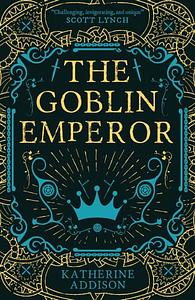Take a photo of a barcode or cover
adventurous
challenging
dark
emotional
inspiring
medium-paced
Plot or Character Driven:
A mix
Strong character development:
Yes
Loveable characters:
Yes
Diverse cast of characters:
Yes
Flaws of characters a main focus:
Complicated
adventurous
challenging
emotional
hopeful
mysterious
reflective
sad
slow-paced
Plot or Character Driven:
Character
Strong character development:
Yes
Loveable characters:
Yes
Diverse cast of characters:
Yes
Flaws of characters a main focus:
Complicated
I can see why many feel this is a masterpiece of worldbuilding. I enjoyed it, especially Maia, but can't give it five stars because the "on ramp" to understanding was the entire fucking book. I admired it but I never felt as if I actually became fully oriented into the world.
That's partly due to the glossary being woefully incomplete and confusing. It was already a longer glossary than any I've ever encountered in decades of SFF reading, but I was continuously paging back to it to look up a name or term and NOT being able to find anything, even when I tried searching under other possible versions. (It took me over half the book to finally realize the honorifics weren't names themselves.) I almost wish I'd kept a list of what was missing, but it was already a cognitively challenging book. I actually was in the mood for something sense that could fully arrest my attention, so I was predisposed to keep giving it the effort it needed. But I still came close to giving up multiple times. Part of what kept me going was the certainty that if I stopped or even paused, there'd be no way in hell I'd be able to remember any of it and would have to start from the beginning again.
I should also mention, I started this as an audiobook and ended up getting the hardcopy so that I could access the glossary. I ended going back and forth a lot, even *reading the hardcopy while listening to the audiobook,* which I have never had to do before. As frustrating as I found the glossary, it was still vital for me and I can't imagine reading just the audiobook. The narrator deserves ALL the awards for navigating all the conlang terms with such confidence and finesse, I am in awe of his performance.
I know I'm griping a lot for a book I gave 4.5 stars. The characters and the story were well done, if you enjoy political intrigues. (I often don't, whoops.) I still managed to enjoy it enough that I'm on the hold list for the trilogy that comes after Goblin Emperor, but if it takes more than a month I have little hope of being able to understand it. Wish me luck!
That's partly due to the glossary being woefully incomplete and confusing. It was already a longer glossary than any I've ever encountered in decades of SFF reading, but I was continuously paging back to it to look up a name or term and NOT being able to find anything, even when I tried searching under other possible versions. (It took me over half the book to finally realize the honorifics weren't names themselves.) I almost wish I'd kept a list of what was missing, but it was already a cognitively challenging book. I actually was in the mood for something sense that could fully arrest my attention, so I was predisposed to keep giving it the effort it needed. But I still came close to giving up multiple times. Part of what kept me going was the certainty that if I stopped or even paused, there'd be no way in hell I'd be able to remember any of it and would have to start from the beginning again.
I should also mention, I started this as an audiobook and ended up getting the hardcopy so that I could access the glossary. I ended going back and forth a lot, even *reading the hardcopy while listening to the audiobook,* which I have never had to do before. As frustrating as I found the glossary, it was still vital for me and I can't imagine reading just the audiobook. The narrator deserves ALL the awards for navigating all the conlang terms with such confidence and finesse, I am in awe of his performance.
I know I'm griping a lot for a book I gave 4.5 stars. The characters and the story were well done, if you enjoy political intrigues. (I often don't, whoops.) I still managed to enjoy it enough that I'm on the hold list for the trilogy that comes after Goblin Emperor, but if it takes more than a month I have little hope of being able to understand it. Wish me luck!
I enjoyed this book, wholeheartedly rec it to fans of slow-paced fantasy, and appreciate the linguistics and worldbuilding. Many reviewers call this a comfort read/feel good book — I can’t relate, but not in a negative way. Maia’s distance from the people he hoped to be friends with hit me harder than the beginnings of true friendships toward the end of the book, which felt gratifying but not as genuine as the distance imposed by his rank.
hopeful
inspiring
reflective
medium-paced
Plot or Character Driven:
Character
Strong character development:
Yes
Loveable characters:
Yes
Diverse cast of characters:
Yes
Flaws of characters a main focus:
Yes
I took an extra-long time to read this book, as I had a number of audiobooks that jumped the queue and some book club books with quicker timelines. One of the reasons it was so easily bumped was because this started out rather slow-paced, but it was compelling enough that it kept drawing me back. I'd like to give this 3 1/2 stars, but as that isn't an option, I'm rounding up to 4 because I'm feeling generous.
The Good - It's a fascinating universe, with layers upon layers of potential sub-plots and interesting characters. One of the reviews I read referred to it as steampunkeque, and I agree. In fact, one of the main inventions, an important retractable bridge, even seemed steam powered. The visit from Maia's goblin grandfather in all of his regalia was fascinating.
The Bad - The characters were very interesting, but the choice of names was unnecessarily confusing. Many of the names sound very similar, and most of the characters were called multiple things. There is a list of characters in the back, but even that is not entirely helpful, as characters are only listed by their "main" names, and many references are to some honorific title or other so you really don't know who they are talking about.
The Verdict - The tie breaker is Maia. He's so likeable, while vulnerable, and also trying to do his best while riddled with self-doubts. Maia is wonderful. The turning point in the point to me was in Chapter 22 when Maia first exerted his authority in a dispute in deciding to do what was right rather than what would most please all of the involved parties. Maia's complex relationships with distant relatives who had nothing to do with him until he became emperor were so expertly drawn, that this book is definitely a keeper.
If you are looking for wave after wave of action, you probably will find this too slow. If you're looking for an interesting universe, courtly political intrigue, and character driven drama, then give it a shot.
The Good - It's a fascinating universe, with layers upon layers of potential sub-plots and interesting characters. One of the reviews I read referred to it as steampunkeque, and I agree. In fact, one of the main inventions, an important retractable bridge, even seemed steam powered. The visit from Maia's goblin grandfather in all of his regalia was fascinating.
The Bad - The characters were very interesting, but the choice of names was unnecessarily confusing. Many of the names sound very similar, and most of the characters were called multiple things. There is a list of characters in the back, but even that is not entirely helpful, as characters are only listed by their "main" names, and many references are to some honorific title or other so you really don't know who they are talking about.
The Verdict - The tie breaker is Maia. He's so likeable, while vulnerable, and also trying to do his best while riddled with self-doubts. Maia is wonderful. The turning point in the point to me was in Chapter 22 when Maia first exerted his authority in a dispute in deciding to do what was right rather than what would most please all of the involved parties. Maia's complex relationships with distant relatives who had nothing to do with him until he became emperor were so expertly drawn, that this book is definitely a keeper.
If you are looking for wave after wave of action, you probably will find this too slow. If you're looking for an interesting universe, courtly political intrigue, and character driven drama, then give it a shot.
reflective
tense
slow-paced
Plot or Character Driven:
Character
Strong character development:
Yes
Loveable characters:
Yes
Diverse cast of characters:
Complicated
Flaws of characters a main focus:
Yes
adventurous
medium-paced
Plot or Character Driven:
A mix
Strong character development:
No
Loveable characters:
Yes
Diverse cast of characters:
Yes
Flaws of characters a main focus:
Yes
Okay, so. I picked this up because I grabbed The Witness For The Dead off the shelf at my local bookstore, and it seemed interesting but was part two of a series, and this is part one.
This is 450 pages that follow one character, largely in one location, through about seven months where nothing really happens. Like, one weapon is drawn in the entire story, and the rest is political court intrigue told through accounts of incessant meetings.
And yes, that sounds absolutely, staggeringly, mind-numbingly boring.
But it is absolutely not. This book is Damn Good(TM). Like, holy crap this is good. I could not stop reading, and burned at least one meal because I had "time for a few pages" and ended up smelling smoke after six chapters. Immediately one of my favourite books I've read this year, and I will recommend this to anybody, whether they enjoy fantasy or not.
This was ridiculously good.
This is 450 pages that follow one character, largely in one location, through about seven months where nothing really happens. Like, one weapon is drawn in the entire story, and the rest is political court intrigue told through accounts of incessant meetings.
And yes, that sounds absolutely, staggeringly, mind-numbingly boring.
But it is absolutely not. This book is Damn Good(TM). Like, holy crap this is good. I could not stop reading, and burned at least one meal because I had "time for a few pages" and ended up smelling smoke after six chapters. Immediately one of my favourite books I've read this year, and I will recommend this to anybody, whether they enjoy fantasy or not.
This was ridiculously good.
2.5 stars rounded down.
I'm usually very particular about the books I read, and it sometimes feels like I spend almost as much time reading a book's reviews beforehand as I do actually reading it. A local bookstore was having a discussion on this book (which I was unfortunately not able to attend due to a scheduling conflict). It was my first time picking up a fantasy book since middle school and, because I was unfamiliar with what I actually would enjoy about the genre, I did much less research than usual before deciding to read The Goblin Emperor. Around a third of the way through, I decided to actually read some reviews and realized that I would have to rapidly readjust my expectations for the rest of the novel.
The Goblin Emperor's premise suggests a high-stakes story. An ostracized young prince, Maia, unexpectedly comes into power after his father and brothers are all killed in an "accident". Even before his arrival at the palace he is reviled by a large part of the court for his ancestry, upbringing, and slander spread by his father, the former emperor. He has no training, no formal education, and no allies. It would be unfair to say that Addison ignores the premise that she sets up, but she certainly doesn't delve into it as much as I was hoping. Every time the stakes rise or the moral problems threaten to make Maia a less-than-perfect character, they are quickly solved and/or sidestepped. I don't know if this is more a reflection of myself or the types of books I read, but I kept expecting Maia to become more coldhearted, or at the very least make a single morally dubious decision. It was almost unrealistic how good of a person he was.
That said, The Goblin Emperor was entertaining for what it was. If you are looking for an escape via a feel-good fiction in which a character overcomes the odds through sheer acts of kindness, you will probably like this book. I enjoyed the worldbuilding, and, unlike other readers, I found the unique grammar and naming conventions charming. After having read this and Psalm for the Wild-Built, though, I think I can safely say that cozy fiction just isn't a genre that compels me.
I'm usually very particular about the books I read, and it sometimes feels like I spend almost as much time reading a book's reviews beforehand as I do actually reading it. A local bookstore was having a discussion on this book (which I was unfortunately not able to attend due to a scheduling conflict). It was my first time picking up a fantasy book since middle school and, because I was unfamiliar with what I actually would enjoy about the genre, I did much less research than usual before deciding to read The Goblin Emperor. Around a third of the way through, I decided to actually read some reviews and realized that I would have to rapidly readjust my expectations for the rest of the novel.
The Goblin Emperor's premise suggests a high-stakes story. An ostracized young prince, Maia, unexpectedly comes into power after his father and brothers are all killed in an "accident". Even before his arrival at the palace he is reviled by a large part of the court for his ancestry, upbringing, and slander spread by his father, the former emperor. He has no training, no formal education, and no allies. It would be unfair to say that Addison ignores the premise that she sets up, but she certainly doesn't delve into it as much as I was hoping. Every time the stakes rise or the moral problems threaten to make Maia a less-than-perfect character, they are quickly solved and/or sidestepped. I don't know if this is more a reflection of myself or the types of books I read, but I kept expecting Maia to become more coldhearted, or at the very least make a single morally dubious decision. It was almost unrealistic how good of a person he was.
That said, The Goblin Emperor was entertaining for what it was. If you are looking for an escape via a feel-good fiction in which a character overcomes the odds through sheer acts of kindness, you will probably like this book. I enjoyed the worldbuilding, and, unlike other readers, I found the unique grammar and naming conventions charming. After having read this and Psalm for the Wild-Built, though, I think I can safely say that cozy fiction just isn't a genre that compels me.
adventurous
dark
emotional
reflective
sad
tense
medium-paced
Plot or Character Driven:
Character
Strong character development:
Yes
Loveable characters:
Yes
Diverse cast of characters:
No
Flaws of characters a main focus:
Yes




